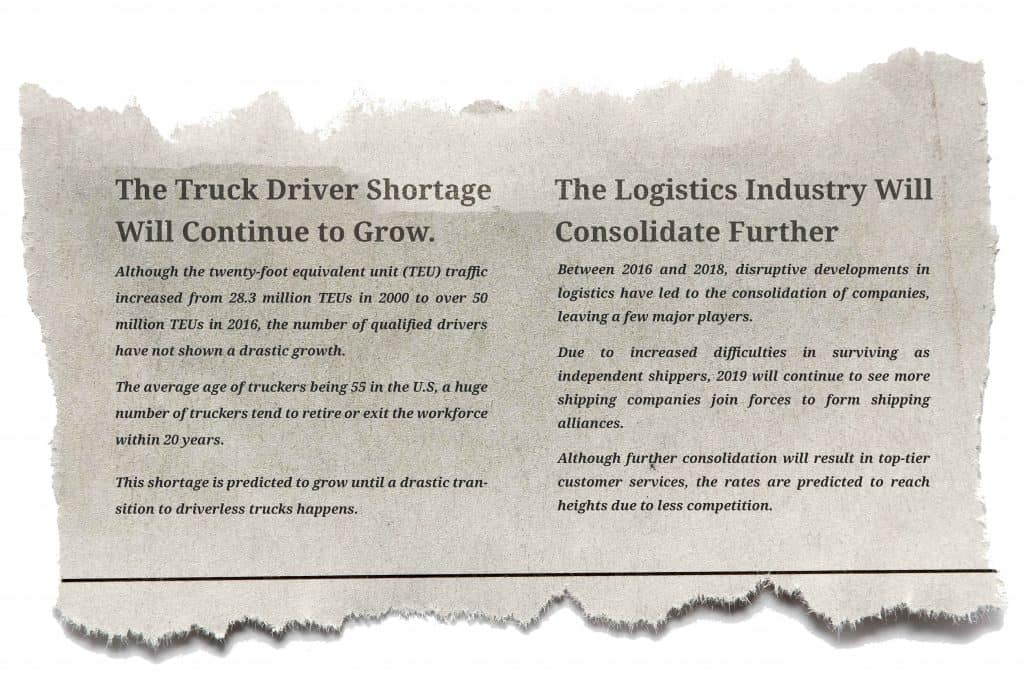Build or Buy Logistics Software – An End To The Prolonged Discussion
How Logistics Companies Can Gain Competitive Advantage with Customized Software Solutions?
Fluctuating consumer demands, increasing client requirements, and complex business models are posing critical challenges for logistics companies today. According to predictions made earlier this year, two major drawbacks are to be witnessed in the industry.

With drastic changes hovering over the logistics industry, the players are bound to stay equipped with the emerging technology trends, or they might get caught off guard. While its turning imperative for logistics companies to transform with smarter technologies, the question of whether to choose a custom software or an off-the-shelf package still lingers in many minds.
Why Choosing Customized Solutions Over Packaged Software Considered Profitable In Logistics?
Purchasing an off-the-shelf software would sound comparatively simple, stress-free and time-effective. But in the long run, it’s always a custom-built solution that pays off.
Most packaged logistics software, although sophisticated and deployed of disruptive technologies, pose standard solutions for the industry as a whole. Of course, they solve the major supply chain hassles. But with every business, possessing unique procedures, workflows, and objectives, “not everyone fits the same mold”.
So what happens when you choose a packaged software solution for your logistics business?
1. A packaged software often comes with hordes of features. This sure sounds exciting at the beginning. But when you have to pay for more than you use, it sure isn’t a happy moment! Off-the-shelf software solutions are often crafted considering the large players of the industry. Their features focus on resolving the common challenges faced by these companies.
However, in a complex industry like logistics, it’s not always necessary for every company to face the same kind of issue. Hence, with packaged software being available as a whole for a single price, businesses usually end up wasting money on features they do not need.
2. Off-the-shelf logistics software utilizes the latest and advanced technologies to cater to the complexities of an industry. But however, at times these sophisticated technologies complexes situations even further. For companies with basic knowledge on latest technologies, would definitely find it difficult to carry out operations successfully with a sophisticated system.
Moreover, they would have to spend extra time and money on training staff, which is not reasonable in a highly competitive industry like logistics. As mentioned before, with plenty of features, packaged solutions often prove to be less user-friendly and more complicated.
3. Although packaged solutions solve a list of logistics hurdles, their features might not provide a complete automated solution. You might find a good Transportation Management System (TMS) that enables real-time tracking and automated reporting, but you might still have to communicate with your customers, and assigned drivers manually.
Also, an efficient packaged TMS system might have an integrated warehousing management system, but might not facilitate an appropriate billing system, leaving the need to adopt alternate transaction processing systems. Hence, in a nutshell, complete automation is often unattainable with packaged software solutions.
4. The most eminent reason to not opt for a packaged solution is that they are rigid. There is hardly any packaged software company that allows customization. It’s not only rare to find a packaged software that caters to all your business-specific needs, but it also proves to be non-scalable in the long run.
Growth in your business and changes in the market will bring about an increase in your technology requirements. This will result in the need for a solution that can be customized with your growing business necessities.
Customized logistics software eliminates all the above-mentioned drawbacks of a packaged solution. Plus, it always comes with continuous technical assistance to simplify the technology transition in your company.
Let’s take a quick look at how a customized Transportation Management System can help you battle logistics challenges better.
Digital Transformation of a Logistics and Supply Chain Company – A Client Success Story
How A Customized TMS Can Enhance Your Supply Chain Efficiency?
Investing in a customized TMS can enable you to create an Uber-like platform for your logistics business. Integrating the latest in web and mobile application solutions, you can create a platform that completely streamlines your driver, client, and cash-flow management.
Enabling centralized data management, transparent billing, delivery match capabilities, along with real-time monitoring and customer insights capturing; a customized software solution can be framed to automate your entire end-to-end logistics operations.
A custom-built mobile application can further enhance productivity with less paperwork, better transparency, easy communication, and improved customer engagement. Implementing a customized solution would also let you add in innovative features that help you automate critical tasks, improve team collaboration, and increase your overall company efficiencies.
Here is a shortlist of benefits that you can acquire with customized logistic software.
1. A customized software solution gives the advantage of integrating with smarter technologies to simplify the minute challenges faced by the industry. For instance, along with assigning and managing truck drivers, a logistics company also faces difficulties in maintaining and verifying driver documents. Integrating with smart apps like Camscanner can simplify these documentation verification complexities.
2. A logistics company with varying client needs might often find difficulties in choosing apt carriers for a given order. A customized solution gives you the benefit to add in features that simplifies such decision making by suggesting the best available carriers for the orders.
3. Although packaged solutions streamline drivers assignment and management, yet they blackout on some eminent functions that logistics companies struggle to maintain. For example, calculating the detention hours/rates of the drivers are likely the most critical task of a logistics company. Through a customized logistics software you can straighten such bends of the industry.
4. With customized logistics software, a logistic company can embrace a completely streamlined and user-friendly accounting system that generates automated invoices as well as tracks any misleads or accounting errors.
Customized logistics software can simplify your logistics operations more than you can imagine. If you are looking for a tech partner to help you add in these features and more to your logistics software, then you have landed on the right page.
Fingent is one of the leading custom software companies providing advanced and user-friendly web and mobile technology solutions for logistics businesses worldwide. Contact us today to know how our custom software solutions can enhance your business abilities.
Stay up to date on what's new

Recommended Posts

25 Jan 2024 Logistics B2B
The Manifold Benefits of Custom Fleet Management Software in Supply Chain
Cost, Compliance, Efficiency, and Manpower – These are the pillars on which a fleet management business stands. A compromise on any of these can mean the whole business topples with……

18 Jan 2024
Why Are Leading Businesses Prioritizing Application Modernization
“In Today’s era of volatility, there is no other way but to re-invent. The only sustainable advantage you can have over others is agility, that’s it. Because nothing else is……

27 Dec 2023 Logistics B2B
The Game-Changing Role of Custom Inventory Management in Supply Chain
Supply chain management is a complex web of processes that involve the seamless coordination of procurement, production, distribution, and more. Among these, inventory management stands out as a pivotal aspect……

20 Dec 2023 B2B
Driving Smart and Sustainable Agriculture with Customized Technology!
As the world grapples with the challenges of climate change, soil degradation, and resource scarcity, agricultural organizations find themselves at a critical juncture. The urgency for adopting sustainable farming practices,……
Featured Blogs
Stay up to date on
what's new










